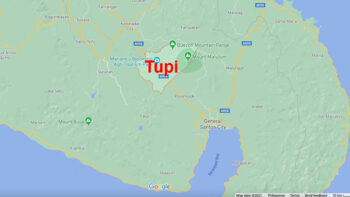The dialogue’s main aim is on “how to cooperate with one another in the continuing search for peace, particularly in Mindanao.”
The decision was reached during a dialogue behind closed doors among these sectors at the Waterfront Insular Hotel in Davao City on August 9, as announced in a press conference at 9:30 p.m.
The August 9 dialogue’s “overwhelming consensus” consisted of three “important convictions.”
These are: “that peace-making is the task of every citizen; that religious leaders and official peacekeepers have a key role to play in this task; and that peace is the fruit of respectful dialogue.”
The six-paragraph press statement read by Cotabato Archbishop Orlando Quevedo, noted that the Bishops-Ulama Conference (BUC), the military and the police “have to build bridges of solidarity, reconciliation and peace by way of dialogue.”
The 32nd BUC General Assembly’s theme is “Towards a Solidarity with our Dialogue Partners in the Military and Police.”
The BUC was represented by co-convenors Davao Archbishop Fernando Capalla, United Church of Christ of the Philippines Bishop Emeritus Hilario Gomez and Dr. Mahid Mutilan, head of the Ulama League of the Philippines.
Capalla announced that the theme for this year’s Mindanao Week of Peace in late November is “Building Bridges of Peace with our Peace Officers.”
National Security Adviser Norberto Gonzales, AFP Chief of Staff Gen. Hermogenes Esperon and PNP chief Oscar Calderon led the military and police while Bishop Leo Tumulak headed the chaplains of the Military Ordinariate whose concern is on the duties of chaplains in the police and the military.
The bishops, ulama, military and police officers also agreed “that dialogue should be both at the level of leadership and also at the grassroots level. In fact it was suggested that the approach should be from the bottom up, from the grassroots to the top. Such dialogue should play a principal role in specific problematic situations, such as in land conflicts, misrepresentation and inaccurate reporting, the threat of hostilities breaking out because of possible flash points, provocations because of biases and prejudices, etc…”
Military representatives to the dialogue “affirmed and emphasized their conviction of giving primacy to the peace process, while the religious leaders reminded themselves of their educational role in the pursuit of peace.”
The sectors also agreed to continue their dialogue through a regular assembly they tentatively call “BUC-Military-Police Forum” that would meet “before every quarterly meeting of the BUC Tripartite Commission or the BUC General Assembly.”
Capalla said the August 9 dialogue and the next dialogues were not triggered by a recent meeting in Davao City between some Mindanao bishops, among them Capalla and Quevedo, and Gonzales, Esperon and Calderon, on the Basilan crisis.
He said this was a decision of the BUC and was agreed upon by the Board even before the late July meeting with Gonzales and company.
Under martial law, a Church-Military Liaison Committee was created in November 1973 to be a “sounding board” for issues of Church and State.
In the case of the killings and alleged cannibal acts of Norberto Manero aka Kumander Bucay, for instance, then South Cotabato Bishop Arliss together with all the priests of the then Prelature of Marbel wrote President Ferdinand Marcos on October 11, 1979 about the killing of the Mamalumpong brothers. Copies of the letter were furnished then Defense Minister Juan Ponce Enrile, Deputy Minister Carmelo Barbero, Major Gen. Fidel Ramos and Justice Minister Ricardo Puno. Thereafter, the CMLC took up the case.
Three days later, CMLC appealed to Pres. Marcos and Justice Minister Puno to send a special prosecutor to conduct a fair and speedy trial.
Warrants of arrest were issued against them, they were held in military custody but when supposed to be presented to the court in March 1981, the military informed the judge the two had escaped.
Several other cases were taken up by the CMLC in various parts of the country. The decision to withdraw was taken up by the Catholic Bishops Conference of the Philippines in January 1983 but its website does not have that particular
document. One account, however, noted that Cardinal Jaime Sin said it had to be done because “we are being made to look stupid.” (Carolyn O. Arguillas/MindaNews)
